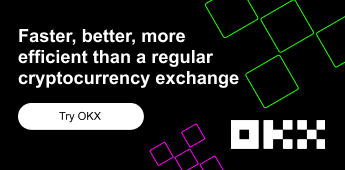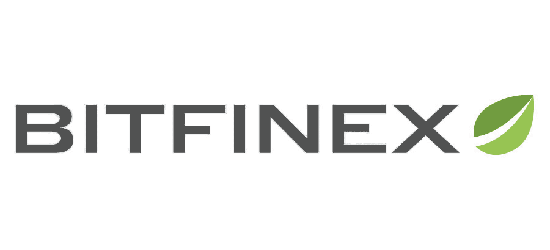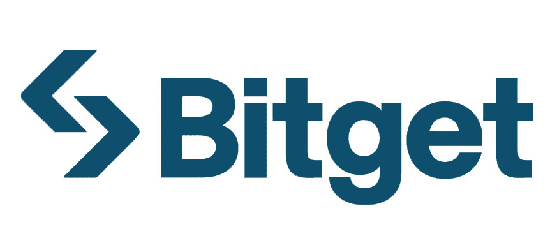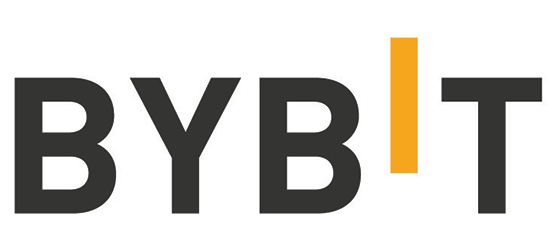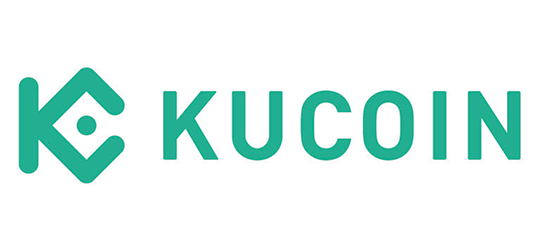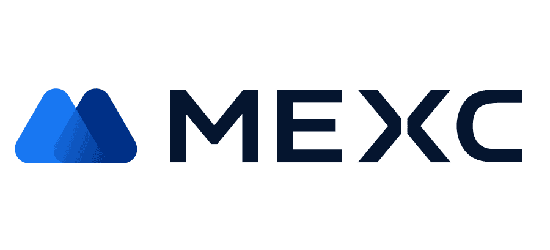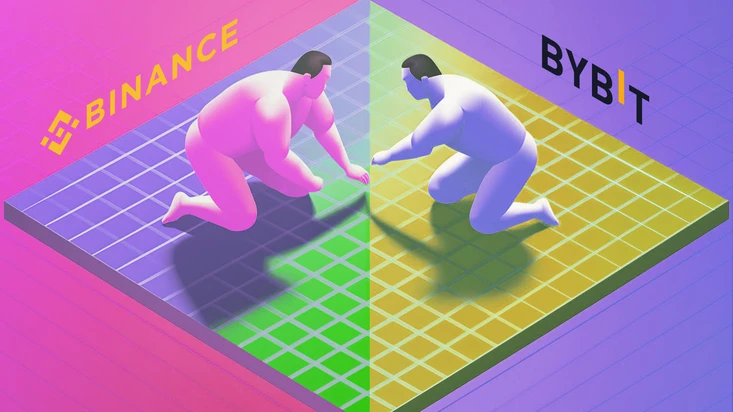
Binance vs Bybit Cryptocurrency Exchange Comparison
This article seeks to provide an informed comparison between the Binance and Bybit exchanges.
Binance vs Bybit
Binance and ByBit stand out as two of the world's largest cryptocurrency exchanges, boasting daily trading volumes in the billions. Both platforms are equipped with an array of features designed to meet the demands of even the most sophisticated cryptocurrency investors.
Binance, holding the position of the world's leading exchange, is renowned for its extensive reach and popularity. On the other hand, ByBit, currently ranked fifth globally, is noted for remarkable growth that outpaces much of the competition.
This article seeks to provide an informed comparison between the two exchanges.
Bybit or Binance at Glance
Binance Exchange ranks among the world's leading cryptocurrency platforms, boasting the most extensive range of trading pairs in the industry. This has propelled Binance to the top in terms of trading volume. Launched in 2017 by Changpeng Zhao, Binance quickly rose to prominence in the cryptocurrency exchange market and introduced its own digital currency, Binance Coin (BNB). Despite facing regulatory hurdles, Binance maintains its status as the largest crypto exchange by volume, serving over 160 million users worldwide.

Binance is renowned for its vast array of products and trading options, including spot, margin, and futures trading. Additionally, Binance offers a native token, BNB, which users can utilize to lower trading fees on the platform. The exchange basically provides every feature and product a crypto user could need, thereby attracting the largest user base globally. However, a notable drawback is the platform's complexity, with an abundance of features that can overwhelm and confuse users, many of whom may find it challenging to navigate and understand the full range of available options.
Bybit, while offering fewer features than Binance, has established itself as a remarkable player in the trading exchange arena, boasting over 15 million users. It offers an impressive Earn section, Copy Trading, an NFT marketplace, and a high-quality trading interface characterized by seamless order execution and advanced order types. Bybit has shown remarkable growth, successfully capturing market share from Binance and transforming into a comprehensive "all-in-one" crypto hub.
Bybit's growth is partly attributed to Binance's regulatory challenges, particularly with the U.S. Department of Justice. While both platforms serve extensive user bases, Bybit distinguishes itself with a clean regulatory record.
| Features | Binance | Bybit |
| Launch Year | 2017 | 2018 |
| Founder | Changpeng Zhao | Ben Zhou |
| Key Features | Extensive trading pairs, spot/margin/futures trading, Binance Coin (BNB) for lower fees | Earn section, Copy Trading, NFT marketplace, advanced trading interface |
| User Base | Over 160 million | Over 15 million |
| Complexity | High, with a wide range of features | Simpler, focused on key offerings |
| Regulatory Challenges | Yes, faced regulatory hurdles | Cleaner regulatory record |
| Target Users | Wide array, due to diverse services | Users seeking a comprehensive crypto hub |
Binance vs Bybit: Supported Tokens and Coins
Binance and Bybit are closely matched in terms of the range of supported cryptocurrencies. Here's a comparison of the coins available on each exchange:
Bybit is not far behind in its offerings. The exchange lists around 494 coins. Bybit is proactive in adding new and trending coins to its platform, ensuring traders have access to the latest options. Key tokens available on Bybit include BTC, ETH, BNB, XRP, USDC, STETH, ADA, DOGE, SOL, and TRX.
Binance, known for its extensive crypto offerings, supports over 390 cryptocurrencies for buying, trading, and holding. The platform consistently adds new crypto coins, keeping its listings updated. Some notable tokens on Binance are BNB, BTC, ETH, CYBER, SEI, WILD, GTG, BLZ, XRP, and ARK.
Bybit edges out Binance slightly in terms of the sheer number of crypto tokens supported. However, the difference isn't significant, and most popular coins are available on both platforms.
Binance: Features, Products and Trading Options
Binance offers an expansive range of trading options across over 400 pairs. It boasts one of the broadest selections of tradeable assets and markets in the industry. Users of Binance can engage in various trading activities, including spot, margin, and derivatives trading. Additionally, the platform features advanced trading tools like P2P trading, trading bots, and grid trading, among others.
Apart from trading, Binance provides an array of other cryptocurrency-related services. These include dual investments, liquid swaps, crypto loans, and a mining pool. Binance also enables users to earn income through various methods such as staking, savings accounts, liquidity farming, BNB vault deposits, and launchpad investments. It offers investment options with both fixed and flexible terms, featuring varying APYs and catering to different risk appetites, from low to high.
Notably, Binance pioneered the introduction of an NFT marketplace in major exchanges, supporting NFTs on both Ethereum and the Binance Smart Chain (BSC). This marketplace rapidly gained popularity, allowing users to buy, sell, and mint NFTs.
The Binance Launchpad is another feature that provides users early access to promising projects before their tokens are publicly launched. This early investment opportunity can be highly profitable.
Moreover, Binance has ventured into automated and bot trading through its Strategy Trading section. This offers a detailed list of Spot and Futures Grid Trading strategies, presenting performance data and popularity ratings for each strategy. This allows traders to make well-informed decisions about replicating these strategies in their own accounts.
Bybit: Features Products and Trading Options
Bybit also offers a variety of trading options, including Copy Trading, P2P Trading, and Margin Trading. Copy Trading allows users to either lead as principal traders or follow other traders, with principal traders earning a share of their followers' net profits. P2P Trading enables users to buy and sell crypto directly with others on a secure peer-to-peer platform. Margin Trading on Bybit allows for up to 100x leverage, enabling traders to amplify their earnings when the market moves in their favorhigher-risk activities such as Dual Asset.
In addition to these features, Bybit has a rewards program, offering bonuses, coupons, cashbacks, and other incentives for completing simple tasks. The platform also hosts the world’s largest crypto trading competition, WSOT, with a substantial prize pool. Bybit Earn is another feature that lets users grow their crypto holdings through various earning options like Bybit Savings, Dual Asset, Liquidity Mining, and Launchpool.
Bybit has also introduced "Easy Options" feature, designed to simplify the options trading process for both beginners and experienced traders. This feature streamlines the trading experience, making it easier for users to identify and capitalize on opportunities.
Bybit features an NFT marketplace that showcases NFTs from renowned creators. This marketplace encompasses a variety of NFT categories, including digital art, collectibles, GameFi, Metaverse, and others, all offered without any fees.
The Launchpad on Bybit was developed as a counter to similar initiatives on other major exchanges. It remains highly active and popular, drawing in investors and hosting high-quality projects.
Bybit vs Binance: Supported Deposit & Withdrawal Methods
Binance has numerous ways of deposit and withdrawal options, varying according to the asset being transacted. Fiat currencies like AUD, EUR, and USD can be deposited without any charge through bank transfers. Some fiat currencies can also be deposited using credit or debit cards to purchase crypto, but this may involve a fee starting at 1.8%. Fiat withdrawals are generally free via bank transfer, and in some cases, direct to a bank card. While depositing cryptocurrency is free on Binance, withdrawals are subject to a variable fee.
On the other hand, Bybit does not directly support fiat currency deposits and withdrawals. Customers looking to use their local currencies must resort to third-party payment services like Banxa or MoonPay, which may come with less favorable fee structures. Nevertheless, Bybit facilitates the deposit and withdrawal of cryptocurrencies, charging only the standard network fees for these transactions.
Bybit Fees vs Binance Fees
Both Binance and Bybit implement a tiered fee structure based on the common maker-and-taker model. Binance offers the added benefit of reduced fees for users who hold Binance Coin (BNB) and achieve specific monthly trading volume thresholds.
Binance's trading fees are determined by a user's 30-day trading volume and their role as either a maker or taker. For instance, a user with less than 50 BTC in 30-day trading volume incurs a maker and taker fee of 0.10% each. These fees decrease as the trading volume increases. Additionally, Binance imposes a margin fee for leveraged trading, calculated as a percentage of the position size.
By contrast, Bybit provides a rebate on maker fees for derivatives trading but does not offer similar incentives for lower fees in spot trading. Also, Bybit features fewer trading pairs compared to Binance, which may necessitate multiple trades for asset swaps, potentially increasing overall fees. In contrast, Binance's extensive range of direct pairs can further reduce fee expenses.
| Fees | Binance Fees | Bybit Fees |
| Spot Trading | Up to 0.1% (maker and taker) | Up to 0.1% (maker and taker) |
| Futures Trading | Maker: 0.02% - 0.04%, Taker: 0.04% - 0.06% | Maker: 0.05% Taker 0.02% |
| Margin Trading | Up to 0.1% (maker and taker) | Maker: 0.05%, Taker: 0.07% |
| Deposit fees | No | No |
| Withdrawal fees | Depends on the type of asset | Depends on the type of asset |
| Fee Reductions | Available for higher volumes/VIPs | Available for higher volumes/VIPs |
Binance vs Bybit: Security Measures
Binance
Binance adheres to top industry standards by storing the bulk of its funds in cold storage, accessible only through multi-signature processes. The platform ensures the protection of user assets through stringent security protocols and state-of-the-art technical defenses. Additionally, Binance employs a comprehensive monitoring system, encompassing everything from advanced data privacy tools to extensive risk management and user security education.
Here's a list of the security features provided by Binance:
- Most user funds are kept in secure, offline cold wallets.
- Robust login procedures, including two-factor authentication with hardware keys, SMS, and email options.
- Anti-Phishing Code implementation.
- Restrictions on cryptocurrency withdrawals.
- Device Management for user account safety.
- Regular security alerts.
- Advanced data encryption technology.
- Compliance with global crypto regulations and routine audits.
- Utilization of compliance technologies such as Ciphertrace, ELLPTIC, TRM, Jumio, and more.
Overall, Binance stands as a highly secure exchange and one of the safest platforms for trading cryptocurrencies. It's worth noting that Binance did experience a significant security breach in 2019, resulting in the loss of 7,000 BTC due to a 2FA exploit. However, Binance promptly addressed this issue, fully reimbursed affected customers, and has since significantly strengthened its security measures, with no subsequent breaches reported.
Bybit
Bybit is recognized for its exceptional security measures, employing top-tier security solutions and collaborating with international regulators to ensure user protection. The platform is developed with a strong emphasis on security, continually updating and advancing its technologies with cutting-edge solutions and innovations.
Key security features offered by Bybit include:
- Secure offline storage of user funds in cold wallets.
- Google Two-Factor Authentication for added login security.
- Anti-phishing Code to combat phishing attempts.
- Fund Password for extra withdrawal security.
- Yubikey Authentication option.
- Withdrawal Address Whitelist and Address Book usage.
- Management of trusted devices.
- Advanced security through multi-signature, Trusted Execution Environment (TEE), and Threshold Signature Schemes (TSS) to safeguard against unauthorized online access.
In addition to these measures, Bybit regularly conducts and publicly shares Proof of Reserves audits, demonstrating transparency. Furthermore, Bybit has implemented a real-time monitoring system that scrutinizes user behavior. This system activates enhanced authentication procedures for withdrawals when it detects any unusual activities, thereby bolstering account security.

Final Verdict
Binance stands out significantly among its competitors, surpassing most other exchanges in various aspects. However, being the largest and most renowned doesn't necessarily make it the ideal choice for every trader, particularly those with specific requirements.
For individuals interested in participating in unique trading competitions and copy trading, we would suggest considering Bybit over Binance. Bybit is particularly well-suited for those focused on futures trading, offering robust support in this area. The platform is notable for its low fees, comprehensive educational materials, and attractive referral program. Additionally, it serves as an excellent alternative for those seeking options beyond Binance.
Despite these advantages, in many other respects, Binance emerges as the more fitting choice for a broad spectrum of crypto traders and enthusiasts. The unmatched combination of security, a vast array of products, and substantial liquidity that Binance offers is hard to rival.
FAQ
Is Bybit Safe?
Bybit employs multiple security measures, including cold storage for funds, two-factor authentication, SSL encryption, and regular security audits, making it a secure platform for cryptocurrency trading.
Is Bybit Available in the US/Can I Use Bybit in the US?
Bybit does not officially operate in the United States due to regulatory reasons. US residents are generally restricted from using Bybit’s services.
Where is Bybit Available?
Bybit is available in many countries globally, except for those with strict regulations like the USA. It's best to check Bybit’s website for specific country availability.
Where is Binance Available?
Binance is available in over 180 countries worldwide. However, it faces restrictions in countries with stringent regulations on cryptocurrency trading, such as the USA.
How Much Does Binance Charge per Trade?
Binance’s trading fees vary: up to 0.1% for spot trading, and for futures trading, the fees range between 0.02% and 0.04% for makers and 0.04% to 0.06% for takers. Fees can be lower for high-volume traders or those holding Binance Coin (BNB).
Ben Zhou Changpeng Zhao Binance Binance.US ByBit




